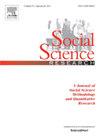在性别和家庭背景的交集下,青少年ICT技能的发展
IF 3.5
2区 社会学
Q1 SOCIOLOGY
引用次数: 0
摘要
我们研究了性别和家庭背景如何影响青少年的信息和通信技术(ICT)技能,定义为与数字技术有效互动的能力,并将其作为处理信息的工具。利用国家教育小组研究9年级起始队列(NEPS-SC4)的客观评估数据,我们分析了9年级学生的ICT技能,其中包括8828名非学术性学生和5309名学术性学生,并在12年级对学术性学生进行了随访数据。结果显示,在九年级时,性别差距在两个方向上都有利于男性,在十二年级时,这一差距在学术方向的学生中扩大。在学术学校,性别和社会背景在影响ICT技能方面相互作用,在社会地位优越的学生中没有性别差异。在非学术性学校,无论家庭背景如何,性别差异在九年级仍然存在。就学术学校的技能增长而言,经济资本较高的学生的性别差距消失了。总之,这些结果表明,在学术学校,更多的特权学生经历更多的性别平等的社会化。本文章由计算机程序翻译,如有差异,请以英文原文为准。
The development of ICT skills in adolescence at the intersection of gender and family background
We examine how gender and family background impact adolescents’ information and communications technology (ICT) skills, defined as the ability to effectively interact with digital technologies and to use them as a tool to process information. Using objective assessment data from the National Educational Panel Study Starting Cohort Grade 9 (NEPS-SC4), which includes 8828 students in non-academic and 5309 in academic tracks in German secondary schools, we analyzed ICT skills in grade 9, with follow-up data in grade 12 for students in academic tracks. Results reveal a gender gap favoring males in both tracks in grade 9, which widens in grade 12 among academic track students. In academic schools, gender and social background interact in affecting ICT skills, with no gender differences among socially privileged students. In non-academic schools, gender differences persist in grade 9, regardless of family background. Concerning skill growth in academic schools, the gender gap disappears for students with higher economic capital. In sum, these results suggest that in academic schools, more privileged students experience more gender-egalitarian socialization.
求助全文
通过发布文献求助,成功后即可免费获取论文全文。
去求助
来源期刊

Social Science Research
SOCIOLOGY-
CiteScore
4.30
自引率
4.00%
发文量
0
审稿时长
65 days
期刊介绍:
Social Science Research publishes papers devoted to quantitative social science research and methodology. The journal features articles that illustrate the use of quantitative methods in the empirical solution of substantive problems, and emphasizes those concerned with issues or methods that cut across traditional disciplinary lines. Special attention is given to methods that have been used by only one particular social science discipline, but that may have application to a broader range of areas.
 求助内容:
求助内容: 应助结果提醒方式:
应助结果提醒方式:


